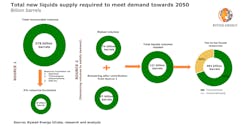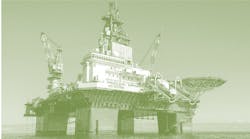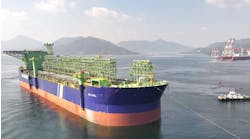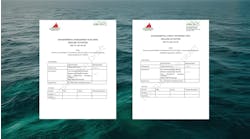Offshore staff
OSLO, Norway – Exploration needs to speed up to help supply the oil volumes needed worldwide by 2050, according to Rystad Energy.
The consultant suggested capex spending of at least $3 trillion would be required to add undeveloped and undiscovered resources totaling 313 Bbbl of oil to volumes from currently producing assets.
There are two main sources for the new volumes: further appraisal of existing fields and resources, and new discoveries.
In the first case, Rystad expects that future exploration activity will lead to reservoir delineation and enhancement of resource estimates, with technological advances and secondary recovery techniques also increasing recoverable volumes.
If future exploration follows recent patterns, the results should boost recoverable resources by around 5%, or 18 Bbbl. This would leave a deficit of around 121 Bbbl to be proven via future wells in currently undiscovered areas.
Conventional discovered liquid volumes globally could stabilize at around 4 Bbbl/yr, the consultant added, with an average discovery size of around 40 MMbbl – in which case exploration would have to deliver 100 new conventional finds each year to satisfy demand.
But not all the volumes proven will be developed and produced, and much of it may not come onstream in time to meet demand by 2050. So discovered volumes will have to be much higher than the required cumulative liquids supply.
Globally the exploration success ratio plunged from around 72% in 2010 to 17% in 2020, Rystad pointed out. It is becoming increasingly difficult to find new resources in mature areas, and a more stringent approach to exploration means that only top-ranked prospects will be drilled.
The consultant foresees an average success ratio of 15% to 20% through 2050, the latter requiring around 500 wells/yr, or 650 wells at a 15% chance of success.
Deepwater areas look set to continue to dominate future new discovered volumes. At the same time, the more challenging drilling environments will lift the average well cost to around $50 million, and the annual cost of exploration drilling to between $25 billion and $33 billion (based on the above success rates).
However, based on success rates of the past decade, with average annual discoveries of 4 Bbbl it could take around 80 years to find the 330 Bbbl needed to cover the supply deficit for undiscovered resources – with the cost of drilling in the range $2-$2.6 trillion.
Around $45 billion of appraisal drilling will also be needed to eke out the 5% incremental volumes mentioned previously.
“The scope of exploration will have to expand significantly,” said Palzor Shenga, senior upstream analyst at Rystad.
“Unless we see a momentous transition in the global energy mix sooner than currently expected, or a much faster development pace than the current norm, upstream players may have to more than double their conventional exploration efforts in order to meet global oil demand through 2050.”
12/10/2020



